books

Reading 1 Peter Missiologically: The Missionary Motive, Message, and Methods of 1 Peter. Littleton: William Carey, 2024.
Examining 1 Peter through a missiological lens unveils the apostle’s strategic approach to cross-cultural evangelism amidst persecution and cultural diversity. It is not just an academic exercise; the authors provide practical insights for missionaries, church leaders, and theologians, helping them to contextualize the gospel in a culturally sensitive manner. This book bridges the gap between theological study and real-world application.
"The field of missional hermeneutics of Scripture, to our great encouragement, continues to produce abundant fruit . . . The book is outstanding not only in the breadth and detail of the topics covered along with extensive bibliographies for further enquiry, but significantly for the diversity of the contributors, many of whom bring illuminating insights and applications from their majority world contexts. A most welcome and enriching contribution to the task of reading the whole Bible with a missional lens." Christopher J.H. Wright, Langham Partnership
Examining 1 Peter through a missiological lens unveils the apostle’s strategic approach to cross-cultural evangelism amidst persecution and cultural diversity. It is not just an academic exercise; the authors provide practical insights for missionaries, church leaders, and theologians, helping them to contextualize the gospel in a culturally sensitive manner. This book bridges the gap between theological study and real-world application.
"The field of missional hermeneutics of Scripture, to our great encouragement, continues to produce abundant fruit . . . The book is outstanding not only in the breadth and detail of the topics covered along with extensive bibliographies for further enquiry, but significantly for the diversity of the contributors, many of whom bring illuminating insights and applications from their majority world contexts. A most welcome and enriching contribution to the task of reading the whole Bible with a missional lens." Christopher J.H. Wright, Langham Partnership
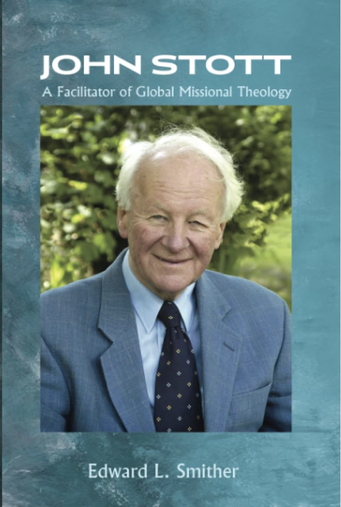
John Stott: A Facilitator of Global Missional Theology. Eugene: Cascade, 2023.
Remembered as a pastor, Bible teacher, writer, and ambassador for global mission, John Stott (1921–2011) was also an early innovator of encouraging global missional theology. Through his involvement in the Lausanne Movement and other global networks, he made room at the table for majority world Christians and theologians to speak to matters of developing global theology. Through his innovative work with Langham Partners, he provided resources for global pastors to be trained in theology and a platform for global theologians to publish their work. Ultimately, he encouraged global theologians to forge their own theology.
"For half a century, John Stott not only participated in the growth of the global church through active ministry and personal relationships, but he also helped to facilitate and amplify the theological voice of the Majority World church and its leaders. This helpful survey by Edward Smither is a most welcome and insightful evaluation of Stott’s remarkable life and significance in the service of God’s global church." Christopher J. H. Wright, international ministries director, Langham Partnership
Remembered as a pastor, Bible teacher, writer, and ambassador for global mission, John Stott (1921–2011) was also an early innovator of encouraging global missional theology. Through his involvement in the Lausanne Movement and other global networks, he made room at the table for majority world Christians and theologians to speak to matters of developing global theology. Through his innovative work with Langham Partners, he provided resources for global pastors to be trained in theology and a platform for global theologians to publish their work. Ultimately, he encouraged global theologians to forge their own theology.
"For half a century, John Stott not only participated in the growth of the global church through active ministry and personal relationships, but he also helped to facilitate and amplify the theological voice of the Majority World church and its leaders. This helpful survey by Edward Smither is a most welcome and insightful evaluation of Stott’s remarkable life and significance in the service of God’s global church." Christopher J. H. Wright, international ministries director, Langham Partnership
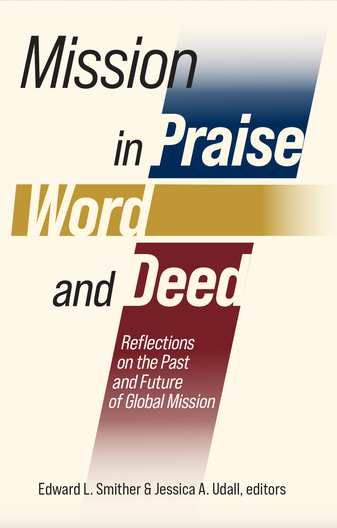
(co-edited with Jessica A. Udall) Mission in Praise, Word, and Deed: Reflections on the Past and Future of Global Mission. Pasadena: William Carey, 2023.
This book represents the latest in missiological thinking. Though some contributors are scholars and even professors, most are field practitioners —evangelists, church planters, Bible translators, medical professionals, refugee workers, and community development specialists. Based on decades of faithful service, they report on what they have learned about mission. The work addresses a wide range of critical concerns, such as informal theological education, Bible translation, business as mission, trauma care, and working on multicultural teams.
As we ponder best mission practices, it’s wise to hear from global practitioners—those who have been at it for a long time. This book represents the diversity of the global church. They are men and women from Africa, Asia, Latin America, North America, and Europe who have served or presently serve in places across the world. These contributors share the conviction that the future of missions involves a growing global church and missionary workforce joining hands to complete the Great Commission amid severe opposition and disruption.
This book represents the latest in missiological thinking. Though some contributors are scholars and even professors, most are field practitioners —evangelists, church planters, Bible translators, medical professionals, refugee workers, and community development specialists. Based on decades of faithful service, they report on what they have learned about mission. The work addresses a wide range of critical concerns, such as informal theological education, Bible translation, business as mission, trauma care, and working on multicultural teams.
As we ponder best mission practices, it’s wise to hear from global practitioners—those who have been at it for a long time. This book represents the diversity of the global church. They are men and women from Africa, Asia, Latin America, North America, and Europe who have served or presently serve in places across the world. These contributors share the conviction that the future of missions involves a growing global church and missionary workforce joining hands to complete the Great Commission amid severe opposition and disruption.
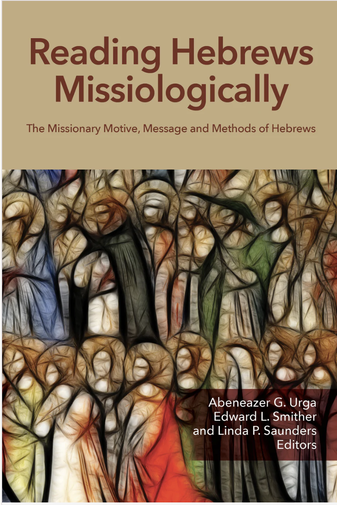
(co-edited with Abeneazer G. Urga and Linda P. Saunders) Reading Hebrews Missiologically: The Missionary Motive, Message, and Methods of Hebrews. Pasadena: William Carey, 2023.
The discussion on the theology of mission in the New Testament usually focuses on Jesus and Paul, with minimal attention given to the General Epistles. However, Reading Hebrews Missiologically tries to fill that gap and focuses on the theology of mission in the book of Hebrews and fleshes out the unique contribution it has to the discussion of a New Testament theology of mission. The twelve contributors—from various theological, geographical, and missiological contexts—explore the missionary motive, the missionary message, and the missionary method of the Epistle to the Hebrews. All Scripture can be read missiologically, and the letter to the Hebrews, with its emphasis on the supremacy of Christ, is no exception.
"Rich in intellectual engagement and scholarly diversity, readers will encounter essays that draw from the best of Hebrews scholarship for a fresh missiological end."--Amy Peeler, Wheaton College
The discussion on the theology of mission in the New Testament usually focuses on Jesus and Paul, with minimal attention given to the General Epistles. However, Reading Hebrews Missiologically tries to fill that gap and focuses on the theology of mission in the book of Hebrews and fleshes out the unique contribution it has to the discussion of a New Testament theology of mission. The twelve contributors—from various theological, geographical, and missiological contexts—explore the missionary motive, the missionary message, and the missionary method of the Epistle to the Hebrews. All Scripture can be read missiologically, and the letter to the Hebrews, with its emphasis on the supremacy of Christ, is no exception.
"Rich in intellectual engagement and scholarly diversity, readers will encounter essays that draw from the best of Hebrews scholarship for a fresh missiological end."--Amy Peeler, Wheaton College
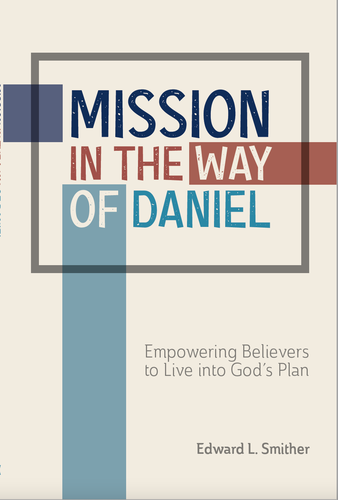
Mission in the Way of Daniel: Empowering Believers to Live into God's Plan. Pasadena: William Carey, 2022.
What can the prophet Daniel teach us about serving in God’s mission? Daniel was not a priest or official religious leader—he was a forcibly displaced Israelite, who became a public administrator in the Babylonian and Persian empires. While he may serve as an example of an admirable work ethic—often finding favor and recognition with political leaders—he is also a prime example of a bold and godly individual, willing to be a witness in his sphere of influence. Though his boldness resulted in suffering, he consistently experienced and demonstrated God’s power in his witness. Mission in the Way of Daniel probes mission theology and practice in the Old Testament, exploring the well-known story of Daniel through the lenses of mission history and mission practice. For mission practitioners, tentmakers, and all Christians, this book shows us how God can use us where we are in life and work.
"A ground-breaking work of missional hermeneutics that offers thought-provoking assessments of the life, witness, and work of Daniel in the Hebrew Scriptures." --Robert Gallagher, Wheaton College
What can the prophet Daniel teach us about serving in God’s mission? Daniel was not a priest or official religious leader—he was a forcibly displaced Israelite, who became a public administrator in the Babylonian and Persian empires. While he may serve as an example of an admirable work ethic—often finding favor and recognition with political leaders—he is also a prime example of a bold and godly individual, willing to be a witness in his sphere of influence. Though his boldness resulted in suffering, he consistently experienced and demonstrated God’s power in his witness. Mission in the Way of Daniel probes mission theology and practice in the Old Testament, exploring the well-known story of Daniel through the lenses of mission history and mission practice. For mission practitioners, tentmakers, and all Christians, this book shows us how God can use us where we are in life and work.
"A ground-breaking work of missional hermeneutics that offers thought-provoking assessments of the life, witness, and work of Daniel in the Hebrew Scriptures." --Robert Gallagher, Wheaton College
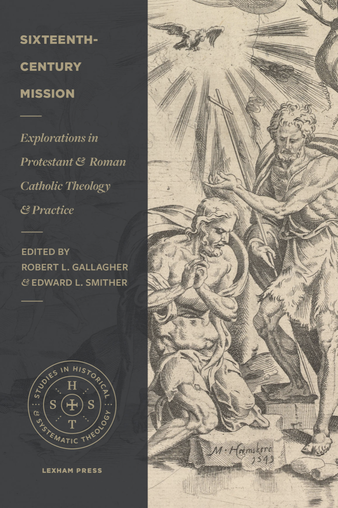
(co-edited with Robert L. Gallagher) Sixteenth Century Mission: Explorations in Protestant and Roman Catholic Theology and Practice. Bellingham: Lexham, 2021. Available in Spanish.
In Sixteenth-Century Mission, a diverse cast of contributors explores the wide-reaching practice and theology of mission during this era. Rather than a century bereft of cross-cultural outreach, we find both Reformers and Roman Catholics preaching the gospel and establishing the church in all the world. This overlooked yet rich history reveals themes and insights relevant to the practice of mission today.
". . . overturns many false assumptions and valuably fills in many gaps: I wish I had read it when I first started teaching church history decades ago." -- Timothy Larsen, Wheaton College
In Sixteenth-Century Mission, a diverse cast of contributors explores the wide-reaching practice and theology of mission during this era. Rather than a century bereft of cross-cultural outreach, we find both Reformers and Roman Catholics preaching the gospel and establishing the church in all the world. This overlooked yet rich history reveals themes and insights relevant to the practice of mission today.
". . . overturns many false assumptions and valuably fills in many gaps: I wish I had read it when I first started teaching church history decades ago." -- Timothy Larsen, Wheaton College
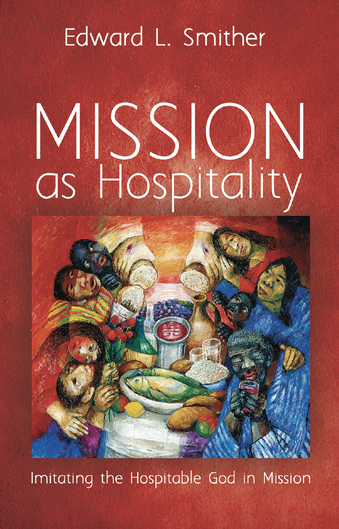
Mission as Hospitality: Imitating the Hospitable God in Mission. Eugene: Cascade, 2021.
God is a missionary God. God is also hospitable in his nature. He makes his enemies friends and invites them to intimate communion. The mission of God in Scripture often occurs through hospitality when God's people encounter the not-yet people of God at table or in hospitable environments and invite them to believe. This motif of mission as hospitality plays out through the Old and New Testament Scriptures, and through the Eucharist. It can also be observed through the witness of monks and contemporary missionaries who embraced a hospitable approach to mission. For the church to participate in God's mission today, a vision to win, conquer, or change the world should be exchanged for a conviction to welcome the stranger and make room for others while proclaiming the gospel--that is, to imitate the hospitable God in mission.
"Combining ancient insights with current examples, Smither invites readers to grasp the power, grace, and transformation that come as we understand and embrace mission as hospitality." --Christine D. Pohl, Asbury Theological Seminary
God is a missionary God. God is also hospitable in his nature. He makes his enemies friends and invites them to intimate communion. The mission of God in Scripture often occurs through hospitality when God's people encounter the not-yet people of God at table or in hospitable environments and invite them to believe. This motif of mission as hospitality plays out through the Old and New Testament Scriptures, and through the Eucharist. It can also be observed through the witness of monks and contemporary missionaries who embraced a hospitable approach to mission. For the church to participate in God's mission today, a vision to win, conquer, or change the world should be exchanged for a conviction to welcome the stranger and make room for others while proclaiming the gospel--that is, to imitate the hospitable God in mission.
"Combining ancient insights with current examples, Smither invites readers to grasp the power, grace, and transformation that come as we understand and embrace mission as hospitality." --Christine D. Pohl, Asbury Theological Seminary
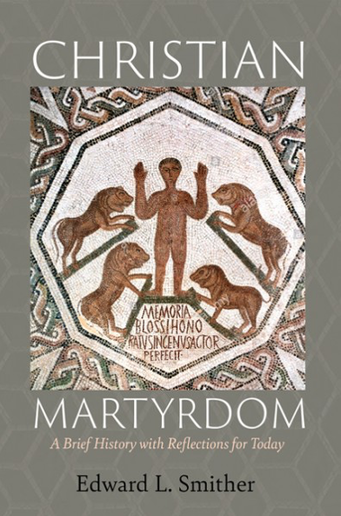
Christian Martyrdom: A Brief History with Reflections for Today. Eugene: Cascade, 2020.
Twenty-first-century Christians in the West crave comfort, affluence, freedom from pain, and even power. However, the story of global Christianity—from Christ, the early church, right up to the present day—has been shaped by suffering and even martyrdom. In this short book Edward Smither explores martyrdom both biblically and historically. He defends three claims: in martyrdom we verbally bear witness to Christ, we raise a prophetic voice, and we worship. Christians today, argues Smither, especially those in the West, should welcome suffering and martyrdom as a normal part of the Christian life.
“Edward Smither has done us a very valuable service by providing a simple and short, but comprehensive, clear, and balanced overview of the nature and history of Christian martyrdom.” --Paul Marshall, Baylor University
Twenty-first-century Christians in the West crave comfort, affluence, freedom from pain, and even power. However, the story of global Christianity—from Christ, the early church, right up to the present day—has been shaped by suffering and even martyrdom. In this short book Edward Smither explores martyrdom both biblically and historically. He defends three claims: in martyrdom we verbally bear witness to Christ, we raise a prophetic voice, and we worship. Christians today, argues Smither, especially those in the West, should welcome suffering and martyrdom as a normal part of the Christian life.
“Edward Smither has done us a very valuable service by providing a simple and short, but comprehensive, clear, and balanced overview of the nature and history of Christian martyrdom.” --Paul Marshall, Baylor University
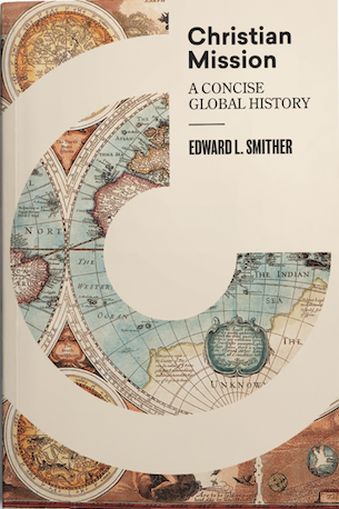
Christian Mission: A Concise Global History. Bellingham: Lexham, 2019.
From the beginning, God’s mission has been carried out by people sent around the world. From Abraham to Jesus, the thread that weaves its way throughout Scripture is a God who sends his people across the world, proclaiming his kingdom. As the world has evolved, Christian mission continues to be a foundational tradition in the church. In this one-volume textbook, Edward Smither weaves together a comprehensive history of Christian mission, from the apostles to the modern church. In each era, he focuses on the people sent by God to the ends of the earth, while also describing the cultural context they encountered. Smither highlights the continuity and development across thousands of years of global mission.
Award of Merit, Christianity Today's 2020 Book Awards.
Cross-Cultural and Missional Resource of the Year, Outreach Magazine.
From the beginning, God’s mission has been carried out by people sent around the world. From Abraham to Jesus, the thread that weaves its way throughout Scripture is a God who sends his people across the world, proclaiming his kingdom. As the world has evolved, Christian mission continues to be a foundational tradition in the church. In this one-volume textbook, Edward Smither weaves together a comprehensive history of Christian mission, from the apostles to the modern church. In each era, he focuses on the people sent by God to the ends of the earth, while also describing the cultural context they encountered. Smither highlights the continuity and development across thousands of years of global mission.
Award of Merit, Christianity Today's 2020 Book Awards.
Cross-Cultural and Missional Resource of the Year, Outreach Magazine.
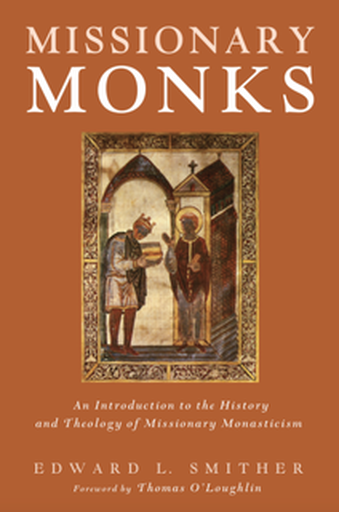
Missionary Monks: An Introduction to the History and Theology of Missionary Monasticism. Eugene: Cascade, 2016.
Missionaries go into all the world and make disciples of all nations, while monks live cloistered in a monastery and focus their lives on prayer and studying Scripture--correct? Not exactly. When we study the history of Christian mission, especially from around 500 to 1500 CE, the key missionaries that we constantly encounter are monks. In fact, if we don't have monks in this period then we have very little in the way of Christian mission. Our aim in this book is to examine the phenomenon of missionary monks--those who pursued both a monastic and missionary calling. We will meet the monks and monastic orders, narrate their journeys in mission, and evaluate their approaches to and thoughts about mission.
"Smither demonstrates that monks from all areas and eras of the Christian world have been engaged in mission . . . it will change your view of monasticism." -- Greg Peters, Biola University
Missionaries go into all the world and make disciples of all nations, while monks live cloistered in a monastery and focus their lives on prayer and studying Scripture--correct? Not exactly. When we study the history of Christian mission, especially from around 500 to 1500 CE, the key missionaries that we constantly encounter are monks. In fact, if we don't have monks in this period then we have very little in the way of Christian mission. Our aim in this book is to examine the phenomenon of missionary monks--those who pursued both a monastic and missionary calling. We will meet the monks and monastic orders, narrate their journeys in mission, and evaluate their approaches to and thoughts about mission.
"Smither demonstrates that monks from all areas and eras of the Christian world have been engaged in mission . . . it will change your view of monasticism." -- Greg Peters, Biola University
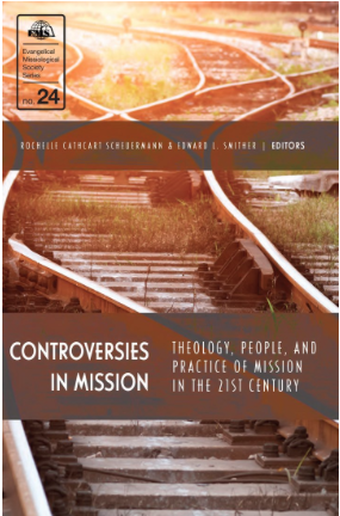
(co-edited with Rochelle Cathcart Scheuermann) Controversies in Mission: Theology, People, and Practice of Mission in the 21st Century. Pasadena: William Carey, 2016.
Crossing social, cultural, and religious barriers and making disciples of all nations has probably never been without some level of controversy. This book is an attempt to hit the pause button on this rapid-paced world and to refllect on how we do mission, especially in light of the new layers of complexity that globalization brings. While the contributors engage in new aspects of mission and cultural encounter unique to the twenty-first century, the underlying issues of each chapter are age-old topics that have reared their heads at various times throughout history: priorities in mission, power struggles, perspectives on cultural others, and contextualization. With that in mind, our aims are twofold: (1) to carefully consider issues causing tension and contention within current mission thought, practice and strategy and then (2) to engage in serious but charitable dialogue for the sake of God’s mission and the salvation of all peoples.
Crossing social, cultural, and religious barriers and making disciples of all nations has probably never been without some level of controversy. This book is an attempt to hit the pause button on this rapid-paced world and to refllect on how we do mission, especially in light of the new layers of complexity that globalization brings. While the contributors engage in new aspects of mission and cultural encounter unique to the twenty-first century, the underlying issues of each chapter are age-old topics that have reared their heads at various times throughout history: priorities in mission, power struggles, perspectives on cultural others, and contextualization. With that in mind, our aims are twofold: (1) to carefully consider issues causing tension and contention within current mission thought, practice and strategy and then (2) to engage in serious but charitable dialogue for the sake of God’s mission and the salvation of all peoples.
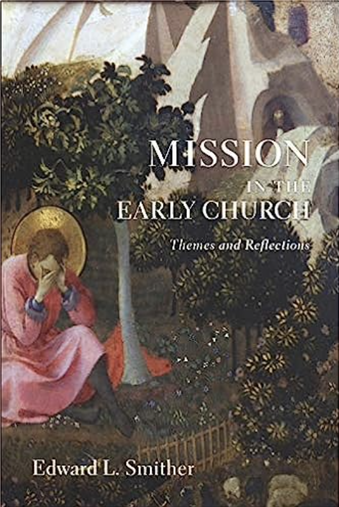
Mission in the Early Church: Themes and Reflections. Eugene: Cascade, 2014.
How did Christian mission happen in the early church from AD 100 to 750? Beginning with a brief look at the social, political, cultural, and religious contexts, Mission in the Early Church tells the story of early Christian missionaries, their methods, and their missiology. This book explores some of the most prominent themes of mission in early Christianity, including suffering, evangelism, Bible translation, contextualization, ministry in Word and deed, and the church. Based on this survey, modern readers are invited to a conversation that considers how early Christian mission might inform global mission thought and practice today.
'Smither . . . has filled an important gap in historical mission studies by surveying the vibrant mission practice of the early church. Smither's insights into the way the whole church was mobilized for mission has profound implications for us today. --Timothy C. Tennent, Asbury Theological Seminary
How did Christian mission happen in the early church from AD 100 to 750? Beginning with a brief look at the social, political, cultural, and religious contexts, Mission in the Early Church tells the story of early Christian missionaries, their methods, and their missiology. This book explores some of the most prominent themes of mission in early Christianity, including suffering, evangelism, Bible translation, contextualization, ministry in Word and deed, and the church. Based on this survey, modern readers are invited to a conversation that considers how early Christian mission might inform global mission thought and practice today.
'Smither . . . has filled an important gap in historical mission studies by surveying the vibrant mission practice of the early church. Smither's insights into the way the whole church was mobilized for mission has profound implications for us today. --Timothy C. Tennent, Asbury Theological Seminary
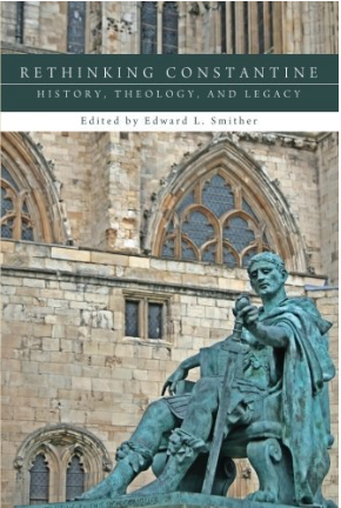
Rethinking Constantine: History, Theology, Legacy. Eugene: Pickwick, 2014.
What happens to the church when the emperor becomes a Christian? Seventeen hundred years after Constantine's victory at Milvian Bridge, scholars and students of history continue to debate the life and impact of the Roman emperor who converted to faith in the Christian God and gave peace to the church. This book joins that conversation and examines afresh the historical sources that inform our picture of Constantine, the theological developments that occurred in the wake of his rise to power, and aspects of Constantine's legacy that have shaped church history.
"In recent days, both scholarly reassessment . . . and popular fiction have brought Constantine to public notice once again, and this collection of essays provides an extremely helpful guide in taking stock of one of the great turning points in church history." --Michael A.G. Haykin, The Southern Baptist Theological Seminary
What happens to the church when the emperor becomes a Christian? Seventeen hundred years after Constantine's victory at Milvian Bridge, scholars and students of history continue to debate the life and impact of the Roman emperor who converted to faith in the Christian God and gave peace to the church. This book joins that conversation and examines afresh the historical sources that inform our picture of Constantine, the theological developments that occurred in the wake of his rise to power, and aspects of Constantine's legacy that have shaped church history.
"In recent days, both scholarly reassessment . . . and popular fiction have brought Constantine to public notice once again, and this collection of essays provides an extremely helpful guide in taking stock of one of the great turning points in church history." --Michael A.G. Haykin, The Southern Baptist Theological Seminary
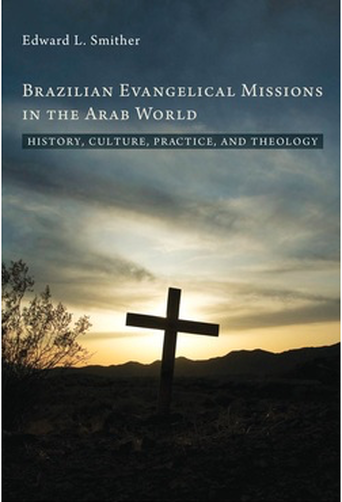
Brazilian Evangelical Missions in the Arab World: History, Culture, Practice, and Theology. Eugene: Pickwick, 2012. Available in Portuguese.
"From a mission field to a missions sender." These words capture the story of the Brazilian evangelical church, which has gone from receiving missionaries in the nineteenth and twentieth centuries to becoming a movement that presently sends out more global laborers than the churches of England or Canada do. After narrating Brazil's missional shift, in this volume Smither addresses one fascinating element of the story—Brazilian evangelical efforts in the Arab world. How have Brazilians adapted culturally among Arabs, how have they approached ministry, and how have they cultivated a theology of mission in the process? This work gives the reader insights from one emerging missions movement with an eye toward a more comprehensive view of the global church.
"In this book, Smither narrates this compelling story of Brazilian missions in the Arab world based on well-documented facts, extensive research, and first-hand experience." --Luis Bush
"From a mission field to a missions sender." These words capture the story of the Brazilian evangelical church, which has gone from receiving missionaries in the nineteenth and twentieth centuries to becoming a movement that presently sends out more global laborers than the churches of England or Canada do. After narrating Brazil's missional shift, in this volume Smither addresses one fascinating element of the story—Brazilian evangelical efforts in the Arab world. How have Brazilians adapted culturally among Arabs, how have they approached ministry, and how have they cultivated a theology of mission in the process? This work gives the reader insights from one emerging missions movement with an eye toward a more comprehensive view of the global church.
"In this book, Smither narrates this compelling story of Brazilian missions in the Arab world based on well-documented facts, extensive research, and first-hand experience." --Luis Bush
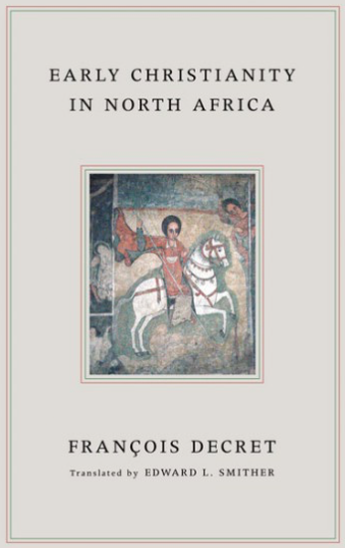
(translator) Early Christianity in North Africa. Eugene: Cascade, 2009.
Along with the churches located in large Greek cities of the East, the church of Carthage was particularly significant in the early centuries of Christian history. Initially, the Carthaginian church became known for its martyrs. Later, the North African church became further established and unified through the regular councils of its bishops. Finally, the church gained a reputation for its outstanding leaders-Tertullian of Carthage (c. 140-220), Cyprian of Carthage (195-258), and Augustine of Hippo (354-430)-African leaders who continued to be celebrated and remembered today.
"Decret and Smither have recognized our dependence on [North African] theologians and given us a thorough and well-presented introduction to that theology. They not only take the reader into that oft-ignored area, but they show why it is so important to appreciate that period." --Thomas O'Loughlin, University of Nottingham
Along with the churches located in large Greek cities of the East, the church of Carthage was particularly significant in the early centuries of Christian history. Initially, the Carthaginian church became known for its martyrs. Later, the North African church became further established and unified through the regular councils of its bishops. Finally, the church gained a reputation for its outstanding leaders-Tertullian of Carthage (c. 140-220), Cyprian of Carthage (195-258), and Augustine of Hippo (354-430)-African leaders who continued to be celebrated and remembered today.
"Decret and Smither have recognized our dependence on [North African] theologians and given us a thorough and well-presented introduction to that theology. They not only take the reader into that oft-ignored area, but they show why it is so important to appreciate that period." --Thomas O'Loughlin, University of Nottingham
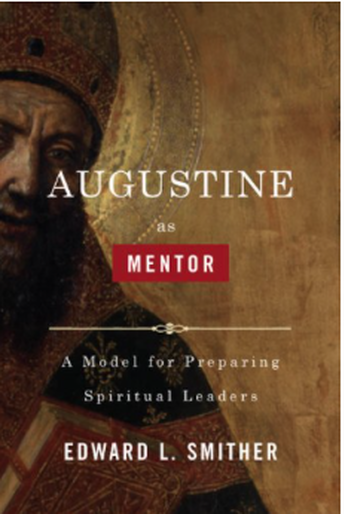
Augustine as Mentor: A Model for Preparing Spiritual Leaders. Nashville: B&H Academic, 2008. Available in Portuguese.
Augustine has influenced virtually every philosopher of the last fifteen hundred years. But his personal character and ministry are even more remarkable, for in a time when most monastery dwellers sought solitude, Augustine was always in the company of friends, visiting disciples and writing mentoring letters to those he knew. Augustine as Mentor is written for modern day pastors and spiritual leaders who want to mentor and equip other evangelical Christians based on proven principles in matters of the heart like integrity, humility, faithfulness, personal holiness, spiritual hunger, and service to others. Author Ed Smither explains, “Augustine has something to offer modern ministers pursuing authenticity and longing to ‘preach what they practice.’ Through his thought, practice, success, and even failures, my hope is that today’s mentors will find hope, inspiration, and practical suggestions for how to mentor an emerging generation of spiritual leaders."
Augustine has influenced virtually every philosopher of the last fifteen hundred years. But his personal character and ministry are even more remarkable, for in a time when most monastery dwellers sought solitude, Augustine was always in the company of friends, visiting disciples and writing mentoring letters to those he knew. Augustine as Mentor is written for modern day pastors and spiritual leaders who want to mentor and equip other evangelical Christians based on proven principles in matters of the heart like integrity, humility, faithfulness, personal holiness, spiritual hunger, and service to others. Author Ed Smither explains, “Augustine has something to offer modern ministers pursuing authenticity and longing to ‘preach what they practice.’ Through his thought, practice, success, and even failures, my hope is that today’s mentors will find hope, inspiration, and practical suggestions for how to mentor an emerging generation of spiritual leaders."
